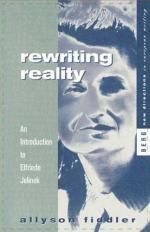|
This section contains 3,050 words (approx. 11 pages at 300 words per page) |

|
SOURCE: Lorenz, Dagmar C. G. “Elfriede Jelinek's Political Feminism: Die Ausgesperrten.” Modern Austrian Literature 23, nos. 3-4 (1990): 111-19.
In the following essay, Lorenz explores Jelinek's attitudes toward feminism and the role of women in Die Ausgesperrten.
While Elfriede Jelinek addresses women's issues she rejects the epithet “Feminist.” Her works focus on sexual politics, the socioeconomic plight of women to which she subordinates the theme of the female body and sexuality.1 Jelinek's literary tool, satire, is an oddity in the post-Holocaust literary scene in Austria and Germany, according to Jelinek, “weil die Juden nicht mehr leben.” Jelinek identifies with the Viennese Jewish tradition mentioning, among others, Kraus's and Canetti's method of dissection as a major influence.2 She places herself in the tradition of political and aesthetic antifascism.
Jelinek believes that the answer to the question about the meaning of life and women's opportunity for gainful employment are immediately connected. In...
|
This section contains 3,050 words (approx. 11 pages at 300 words per page) |

|


